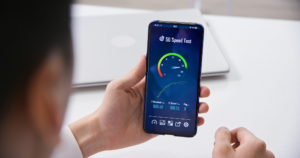December 26, 2022 — Clearwave Fiber is now providing a growing number of homes, businesses and organizations of all sizes with the best in Internet business service via Fiber optic cable. As a local company ourselves, we pride ourselves on being your partner – not just your service provider. If you have questions or need support, we’re here for you!
Please see below for some answers to common questions we hear from homeowners and business owners. We’re here to help you make informed decisions about the technology you rely on, so your family and your company can function at optimal speed.
Q. What is Fiber optic cable and how does it work in communications?
A. Fiber optic cable, or Fiber cable, is made from silica glass or plastic filaments each as fine as a human hair. They’re used to turn data into light and then transmit that information at speeds that can approach the speed of light.
Fiber cable is used in multiple applications, including video transmissions, power lines, local access networks (LANs), and by Internet service providers (ISPs) like us who are building Fiber networks to deliver high-speed, high-capacity communications services to the businesses and residents we serve.
Q. How old is Fiber optics technology?
A. The idea of using light to share information goes back at least as far as Alexander Graham Bell, who experimented with the technology while inventing the telephone in the 1880s. A century later, the rapid development of laser tools that could serve as the source of the signals’ transmission led to the first commercial production of Fiber cable in the 1970s.
Q. What are some of the major advantages of Fiber cable compared with copper cable?
A. There are many ways that Fiber cable is superior to copper cable-carried Internet for today’s modern businesses. Those that rely on multiple cloud-based applications are even more well-suited to Fiber due to the large amount of bandwidth needed.
Advantages include far greater speed and bandwidth, uptime reliability, the ability to transmit data over distances without attenuation (signal loss), better resistance to weather conditions, no electromagnetic interference from cables in close proximity, and the ability to better secure the enterprise against hackers and data theft.
You also won’t experience the speed throttling that some ISPs must do to share bandwidth over copper cable, and upload and download speeds are the same. No more glacial uploading of data files or glitchy video calls!
Q. What are the four major types of Fiber optic cable connections?
A. Your business can be served by Fiber cable in multiple combinations of the following:
- Fiber-to-the-Node (FTTN) – FTTN means the fiber cabling ends at a node, a connection hub that can be as far as a mile away from your business. This can lead to significant signal loss over copper lines that must bring connectivity the rest of the way.
- Fiber-to-the-Curb (FTTC) – FTTC means the Fiber terminates at the curb or somewhere on the edge of your property, usually at a power pole or a dedicated pedestal. There’s less distance for the copper to reach your applications, thus less signal loss.
- Fiber-to-the-Home (FTTH) – FTTH means that Fiber cable is used all the way to your home or business itself for optimum speed, capacity, reliability, and security.
Q. What’s bandwidth and why does that matter to my business or organization?
A. Bandwidth is how much data can be moved per second. It’s related to speed, which is how fast the data moves per second, but it’s about capacity.
Just one example: That copper-line LAN that can handle up to 30 telephone calls at once over your VoIP cable phone system? Make that more than 300 using an equivalent Fiber-connected system.
The greater the bandwidth:
- The more users you can serve simultaneously
- The more files you can transmit at once
- The more clear and reliable your teleconference connections
- The more stable will be those data-intensive business applications that are now housed in cloud-connected web service environments
To learn more about our Fiber Internet business services or Internet service for your home, please reach out! We’d love to get you connected and be your provider of choice for residential Internet service, Internet business service and business phone service.
Check out our 100% Fiber plans:
Click here for high-speed residential Internet
Click here for reliable business Internet


